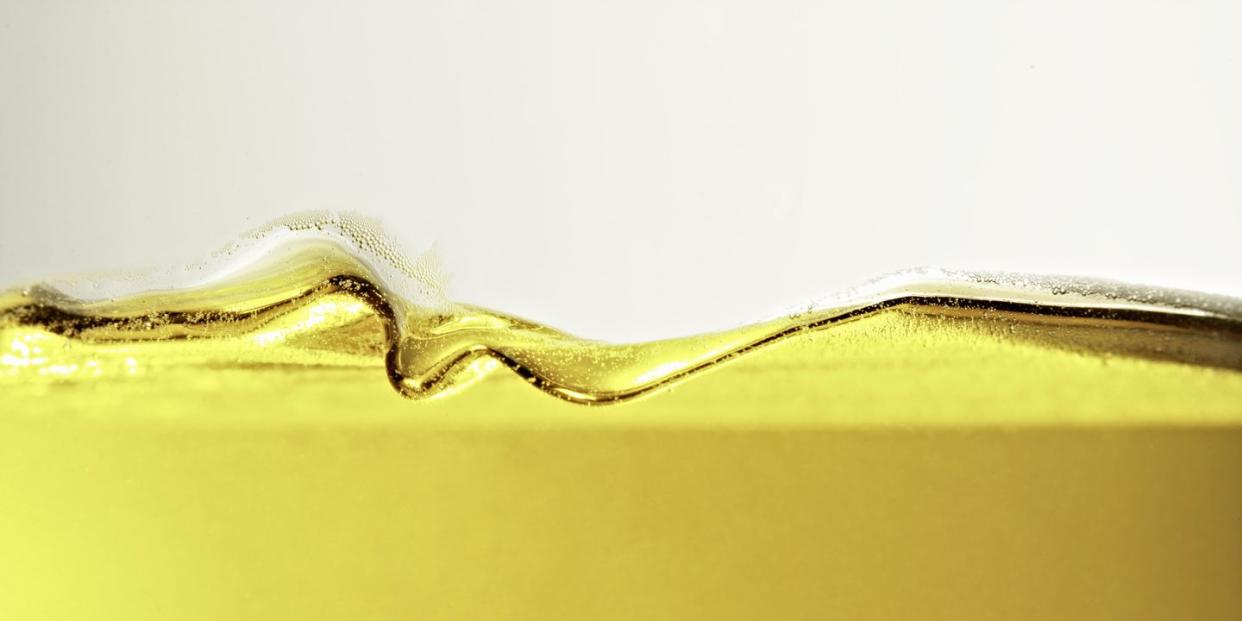Should I Be Worried If I Have To Pee *All* The Freakin' Time?

Part way into your morning coffee, you suddenly have to dash out of a meeting in fear you’ll pee your pants. Or, an hour after making a pit stop on a road trip, you find yourself needing to pull over at another gas station. It seems like you’re peeing a lot lately-and you're really not sure what's up with your bladder.
Your bladder can be a sensitive beast, experts say. “There are a number of reasons influencing how often we have to pee, including age, diet, medical conditions, medications, volume of fluid intake, and type of fluid intake,” says Ekene Enemchukwu, MD, a urologist at Stanford Medical Center.
But the truth is, some people just have a different anatomy and a smaller bladder, or their body makes more urine than others. It's also possible that someone else you know who drinks a ton of water but never has to pee, it seems, has trained their bladder a bit better to hold pee for longer.
Another one of the most common reasons behind an urge to pee: age. As you get older, you’re at an increased risk for an overactive bladder and urinary incontinence, a.k.a. loss of bladder control, which can cause incredibly annoying issues with, err, reaching the loo in time.
But hey, what if you still consider yourself *young-ish*? In your case, here are some of the reasons you might be peeing a lot more than you want to be-and what you can do to fix your pee problems.
1. You’re chugging coffee.
Bladder irritants like carbonated beverages, spicy foods, acidic fruits, artificial sweeteners, sugars, and alcohol can leave you peeing a lot. Caffeinated drinks pack a particularly strong punch, though. “Caffeine is both a direct bladder irritant, and it’s also a diuretic,” explains Bilal Chughtai, MD, an associate professor of urology at Weill Cornell Medicine. “It makes your bladder more overactive, and it also makes you produce more urine.”
To dial down your urge to pee, limit yourself to two cups of caffeinated drinks a day-that’s the max before you start upping your urinary frequency, one study in the International Urogynecology Journal found.
2. You’re mega stressed.
As if anxiety and stress didn’t stink enough on their own, here’s one less-talked-about side effect: peeing a lot. “Sometimes, if you’re anxious or stressed, that can lead to high sensitivity of the bladder,” says Dr. Chughtai.
3. You have a urinary tract infection (UTI).
Yep, you guessed it: urinary tract infections (a.k.a. ‘cystitis’ if bacteria strike your bladder) love to make you pee a lot or at least feel an urge to pee. Sex (which can spread germs from your vagina to your urethra) can up your risk for the pesky infections. If you have a urinary tract infection, you’ll likely need an antibiotic to keep symptoms at bay (and to start peeing normally again).
4. You’re super backed up.
If you’ve been constipated for a while now, frequent urination can tag along with your symptoms (yep, super crummy). Why? Lots of straining puts extra stress on your bladder muscles and pelvic floor, which are essential for helping you control the urge to pee. Over time, this excess pressure weakens your muscles, making it harder to hold it. Often, upping your fiber intake is enough to move things along down there.
5. Baby’s putting extra pressure on your bladder.
Peeing a lot or leaking while preggers? That’s typical. In fact, four in 10 expectant mamas struggle with urinary incontinence, a review in the International Urogynecology Journal showed. Weight gain and baby’s growth alike can put more pressure on your pelvic floor and bladder muscles, weakening your ability to hold in pee. What’s more? The weaker your bladder is, the less urine you can store, cuing the urge to pee and more leaks.
Good news, though: After you welcome your little one, your muscles typically heal and you get your bladder control back (read: urinary frequency slows, too). If you’re still having bladder problems six weeks post-baby, give your doc a call for a checkup.
6. You have diabetes.
A few symptoms of uncontrolled diabetes? Excessive thirst and frequent urination (nighttime urination can also be a sign). If you have untreated diabetes, your body is trying to get rid of excess blood sugar, which means you wind up peeing a lot. Dehydration can follow making for a vicious cycle.
7. You have interstitial cystitis (IC).
This condition-a chronically inflamed and irritated bladder-is the whopper of your why do I pee so much worries. If you’re suffering, your pelvic area likely hurts. And while peeing a small amount of urine gives you some relief, as soon as your bladder fills back up, you’re in pain again. Sometimes, the urge to pee is constant-even if you just went to the bathroom.
Sound familiar? Head to your doc (who might refer you to a urologist) to ID the condition and get treatment, which is usually a mix of medications and lifestyle tweaks.
Remember: Peeing a lot can be a sign of these conditions, but it can also be totally normal.
Honestly, maybe you just *way* overdid it with the water or coffee one day. So beyond addressing the above issues, Dr. Enemchukwu has her patients practice bladder retention techniques such as this one: If you typically have to pee every two hours, try to stretch it to two and a half and eventually three hours between bathroom breaks. “The goal is to train the bladder over time to hold more urine,” she says.
And, of course, there’s always good old-fashioned kegel exercises, which strengthen your pelvic floor to give your bladder muscles the support they need to hold your pee. Still worried about the rate at which you’re going? Play it safe and see your doctor.
('You Might Also Like',)
